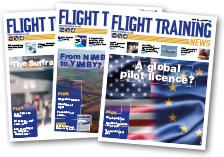Transport Minister Grant Shapps has confirmed that the UK is to terminate is membership with the European Union Aviation Safety Agency (EASA).
During an interview given in Washington DC on 06 March, Shapps told US news outlet Aviation Week, “We will leave EASA. The powers will revert to the CAA, who are probably one of the world’s leading regulators and the expertise will need to come home to do that, but we’ll do it in a gradual way.”
In keeping with the wider BREXIT debate, early reaction to the announcement has been mixed, and concerns are being raised about whether industry has been too slow to respond to what was a not-unforeseen scenario, but which has nonetheless apparently taken some in the industry by surprise.
UK industry body ADS was quick to voice its concerns: “We have been clear that continued participation in EASA is the best option to maintain the competitiveness of our £36bn aerospace industry and our access to global export markets.
“UK influence in EASA contributes to raising standards in global aviation, supports collaboration with our international partners, and helps make our industry attractive to the investment it needs to be home to the development of a new generation of advanced aircraft technology.
“Government had promised it would consider harmonisation where it is in the UK interest and will be led by the evidence on the future of aviation safety regulation.
“We are disappointed that it has not taken a more ambitious approach. It is essential that it works with us to deliver a regime that does not put jobs at risk in an industry that employs 111,000 people in highly skilled roles across the UK.”
Created in 2002, EASA is the pan-European regulator for 27 member states and four signatory states. Providing common aviation standards, the Agency works in concert with each member state’s National Aviation Authority (NAA), with the NAA acting as regional arm for EASA, while also retaining full regulatory responsibility for those national aviation activities that are outside of EASA’s remit.
Membership of EASA has meant that NAAs have been generally scaled-back across the EU due to services being divided up between them, rather than each NAA undertaking the same tasks, thereby effecting economies of scale. This has led to a reduction in staffing levels at the CAA, which puts the Authority in a potentially precarious position if it is to resume full regulatory oversight for all forms of UK aviation.
As alluded to by Shapps, some of the expertise that the CAA formerly retained decamped to Cologne when EASA set up office there in 2003, and the UK will need to either entice them back or look to recruit a new regulatory workforce, and probably both.
FTN understands that since the beginning of the year, the UK CAA has been excluded from participation in EASA’s activities including attendance at various standing committees and groups. It’s not clear whether this action has prompted the announcement that the UK will leave EASA.
Enticing former CAA employees back from Cologne may prove to be a challenge.
Contacts at EASA have told FTN that enticing former CAA employees back from Cologne may prove to be a challenge. Unless the UK can match (and perhaps exceed) the remuneration packages that EASA offers, then decamping from Cologne to Gatwick may not prove too attractive, and questions are already being asked about how the CAA will find the funds to achieve this.
With the CAA defined as a public corporation, established by statute, it’s the only NAA in Europe which does not receive direct government funding. Instead, the UK Government requires that the CAA’s costs are met entirely from the charges it levies on those whom it regulates, and it is further required to make a return on capital – in other words turn a profit.
“The UK Civil Aviation Authority has been planning for this outcome since the 2016 referendum, and we are prepared to take over regulatory responsibilities from EASA”
The CAA has nonetheless said that it is ready for the switchover and has spent the last four years preparing for the change.
In a statement published on the regulator’s website shortly after the Transport Minister broke the news, Tim Johnson, CAA Policy Director, said: “The UK Government and the European Union have both said they intend to agree a bilateral aviation safety agreement, as the UK will no longer participate in the European Aviation Safety Agency’s (EASA) system after the transition period ends.
“The UK Civil Aviation Authority has been planning for this outcome since the 2016 referendum, and we are prepared to take over regulatory responsibilities from EASA. There will be no immediate changes to aviation regulations at the end of this year, because of these preparations.
“Our plans have been shared widely with the aviation and aerospace industries, the International Civil Aviation Organisation and other national aviation authorities around the world. As a national safety regulator, we will continue to work closely with these agencies, maintaining open dialogue and sharing best practice.”
Included in the CAA’s long-standing advice to professional pilots has been a recommendation to seek a change in ‘State of Licence Issue’ (SOLI) in order to guarantee continued access to the European market once BREXIT has concluded. This has led to individual pilots, flight training schools, maintenance organisations and airlines re-registering with other EASA member states.
For individual pilots, the process requires gaining a new medical certificate with a medical examiner registered with the selected Member State ahead of transferring licences.
Many British pilots flying with Ryanair, for example, have changed their ‘SOLI’ to the Irish aviation authority, the IAA. UK-based flying schools have also been re-registering with other EASA Member States, although have tended to retain UK CAA approval as well, as have a number of maintenance organisations.
British airlines have likewise been making preparations, with easyJet setting up ‘easyJet Europe Airline GmbH’ in Austria in 2017, transferring a significant number of its aircraft and pilots to the Austrian register.
All this ‘regulatory shopping’ has had a direct cost on the CAA, however, in that it has been losing customers. One of the most frequently asked questions since the announcement has been from those cadet pilots currently part-way through training, or who are about to embark on training, namely: what are the immediate implications for their training?
Bristol Ground School (BGS) is one of the industry’s leading ATPL theoretical knowledge training schools, and was one of the first UK ATOs to seek non-UK EASA approval. BGS now deliver both UK CAA and Austro Control training programmes and exams at their training centre in Clevedon, near Bristol.
Looking at the implications of the UK’s departure from EASA, BGS are advising cadets who are currently enrolled on flight training programmes, but who won’t graduate this year, to aim to graduate with a non-UK EASA licence.
The UK CAA has said that it will accept non-UK EASA licences for pilots flying UK-registered aircraft post-2020, but EASA has yet to reciprocate, although ongoing negotiations are hoped to see this resolved over the next few months. However, as things currently stand, the general consensus is that a non-UK EASA licence is a better option than a UK-issued EASA licence in terms of ease of conversion.
Many UK ATOs have already taken the step of gaining non-UK EASA approvals, and so will continue to be able to train pilots seeking an EASA licence. BGS advises that cadets check with their ATOs that they have this non-UK EASA approval and that they also have arrangements in place to deliver EASA ground exams and flight testing.
For those looking at starting their training from 2021, BGS says that the jury is still very much out, but holding an EASA licence may provide the greatest number of employment opportunities. Further, if the UK hasn’t reached an accommodation with EASA by next year it will be easier to convert an EASA licence to a UK one rather than the other way round.
However, many airlines will stipulate the ‘SOLI’ they want of their new pilots. FTN understands that British Airways, for example, has confirmed that its pilots will continue to be required to hold UK-issued licences, and that non-UK EASA licences would need to be converted to UK equivalents.
Other UK airlines have yet to confirm their future requirements, but there is a possibility that while the CAA will recognise EASA licences for pilots flying UK registered light aircraft, it may insist that all commercial pilots flying UK registered airliners will have to hold UK licences.
While this would ensure that the CAA continues to get licensing income from these pilots, the loss of income from those other pilots who have changed their SOLI to an alternative EASA Member State will nonetheless have a negative impact on the CAA’s finances, as will the loss of income from those businesses that will need to re-register in mainland Europe.
With no central Government funding in place, the question that many are now asking is how will the CAA cope, and who will end-up paying the costs of a withdrawal from EASA?







